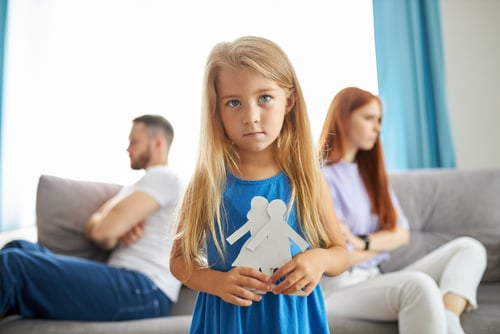As we grow up, most of us get a new perspective on specific events that happened during our childhoods and learn to see them in a new light with the wisdom and rational thinking that enables us to recognize the reasons behind certain emotions and behaviors.
However, for some people, certain childhood events carry substantial emotional burdens that are hard to let go of even when they understand the underlying causes of unpleasant emotions, leading to trouble with healing from developmental traumas. In some instances, including severe traumatic events, it’s also possible to be unaware of how those childhood emotions and fears shape us into and through adulthood. Some people may find themselves fighting the wrong fight, needing “proof” that someone is trustworthy, feeling like it’s “never enough” and so on…
What Are The Signs And Types Of Childhood Trauma?
People who experience trauma as children may be able to overcome it with maturity, time, or professional help if needed. Others may not even be aware of how they were affected by childhood events. As a result, they could continue to suffer the consequences and carry negative feelings into adulthood. This is why it’s essential to recognize the signs of childhood trauma. It can be the first step toward healing and rebuilding relationships with yourself, others, and the world around you. If it is suppressed, then typically one may develop an avoidant style in relationships with others. Avoid getting hurt, therefore, don’t get too close.
When it comes to different types of childhood trauma, they range from neglect and lack of attention to causing physical harm to a child. In each case, the damage to a child’s emotional, mental, and physical health can be severe. The most serious examples of childhood trauma include:
- Abuse. Verbal, emotional, or physical abuse; sexual abuse or incest.
- Severe neglect or abandonment.
- Dysfunctional home life, parents fighting, domestic violence, or separation from a parent.
- Dysfunctional social environment, like school shootings, bullying, poverty, war, or racism.
- Death or illness of a loved one – parent, sibling, or other close people in a child’s life.
- Witnessing a death, suicide, or murder.
- A serious illness that isolates a child from friends, school, or other areas of their life.
- Accidents like car crashes, fires, and other sudden terrifying events.
- Natural disasters like earthquakes or floods that affect entire communities can be particularly distressing for a child and make them feel unsafe.
Any kind of violence or sudden disaster can be severely traumatic for a child, even when it doesn’t appear so at the time. Children may hide or suppress their emotions, primarily if they’ve been taught that expressing them is a sign of weakness.
Unsurprisingly the most common signs of childhood developmental trauma are:
- Lack of trust in other people.
- Mood swings and unstable emotions.
- Unfulfilling and toxic relationships.
- Anger and aggression.
- Substance use or other self-harming behavior.
- Attention and focus issues.

What Are The Potential Impacts Of Childhood Trauma?
All types of traumas cause inevitable damage to the person experiencing them. The extent to which traumatic events will affect someone will naturally depend on each person’s character, coping mechanisms, and ability to examine the events that lead to traumatization rationally. The consequences of traumatic events can last a lifetime, affecting a person mentally, physically, and socially.
Since children’s brains haven’t had the chance to develop fully, they’re primarily driven by emotions. As a result, a child lacks the capacity to look for reasons behind the traumatic events, which is why the impact of developmental trauma on a child is considerably more profound than on a grownup.
The physical effects of trauma can be just as severe as the emotional ones. The stress a child is subjected to can impair the immune system development, as well as the nervous system. This can significantly raise the risk of illness later in life, particularly chronic ones like:
- Asthma
- Diabetes
- Heart disease
- Pulmonary disease
- Stroke
- Autoimmune diseases
- Cancer.
As far as mental and emotional health is concerned, the most common consequences can include:
- Anxiety, panic attacks, or depression.
- Insomnia, nightmares, flashbacks, sleep problems.
- Lack of energy.
- Low self-esteem.
- Feelings of guilt or shame.
- Withdrawing from others.
- Inability to identify, control and express emotions.
- Intense reactions and anger control issues.
- Post-traumatic stress disorder (PTSD).
- Obsessive or compulsive disorders.
- High irritability and stress levels.
- High-risk behaviors, substance use, or self-harm.
People exposed to complex trauma as children may become dissociated or disconnected from their sensory experiences and thoughts. As a result, they can lose their sense of self or even have trouble remembering certain parts of their lives.
Another critical aspect of childhood trauma is the tendency to affect the ability to form healthy relationships. For example, people who experience traumatic events in early life might suffer from trust issues and have problems interacting with people in a healthy way.
The fear children experience can make them believe that the world is a dangerous place and that people can’t be trusted. This fear can affect all their relationships and make it hard to form deep and meaningful friendships and healthy romantic relationships.
Can You Overcome Childhood Trauma?
Overcoming trauma can be difficult for some people because lasting brain changes make a much deeper imprint in early childhood. A child’s brain is not fully developed, so any traumatic experience can cause drastic alteration or lead to neurological or psychiatric pathology. In addition, various parts of the brain respond to terrifying events. As a result, affected areas become permanently altered, disrupting normal psychological and emotional development.
If these changes are quite severe, overcoming childhood trauma may require challenging and usually prolonged professional therapy. The main goal of such treatment is to understand the changes that have caused emotional and behavioral issues. Once the problems are identified, recovery can begin. This can be a long and challenging journey that may require significant effort and patience. Know this – you can get help and change your adult patterns!
How Do I Heal Childhood Traumas?
Healing from childhood trauma can be a lengthy process for many people. This is because all those negative emotions get seeded deep into the subconscious while your brain is still not fully formed. Even recognizing and identifying your issues is a huge step toward recovery.
Unfortunately, simply being aware of the reasons behind your emotional distress isn’t enough for it to go away. Instead, it’s necessary to adopt new, healthier thought patterns that will guide you to healthier behavior patterns and more meaningful relationships with people. PIVOT from habitual actions to healthy actions.
However, the most important relationship you need to address is the one you have with yourself, your self-image, and your self-worth. And, really understand and differentiate between your developmental parts! This is certainly not an easy task, as you must process all the distressing emotions stuck in your mind and body all your life. Only after finding a way to beat the sadness, fear, shame, or anger can you learn to love yourself and truly open yourself to loving others.
The healing journey will take you through acknowledging the trauma and accepting that it’s not your fault and doesn’t determine who you are as a person. First, it’s necessary to stop suppressing your emotions and address them, as painful as they might be. You might realize they’re not as terrifying as they seemed buried deep down. As you reveal them to yourself and others, you can start to let go of the pain, guilt, and shame and allow yourself to be your true self – not perfect, yet free of fear.

How To Heal From Trauma With PIVOT Support And Guidance
If you’ve recognized that your childhood trauma experiences are affecting your life and relationships, you’ve already made a step toward healing. Addressing it and learning to think more positively about yourself and others is something you can practice and learn in our Glass House retreat workshops.
Practicing self-love with people on the same journey can feel liberating and help you find the strength you didn’t know you had before. However, if you don’t feel ready to open up in front of others, you can opt for private individual sessions with our expert coaches, who will guide you to healing every step of the way.